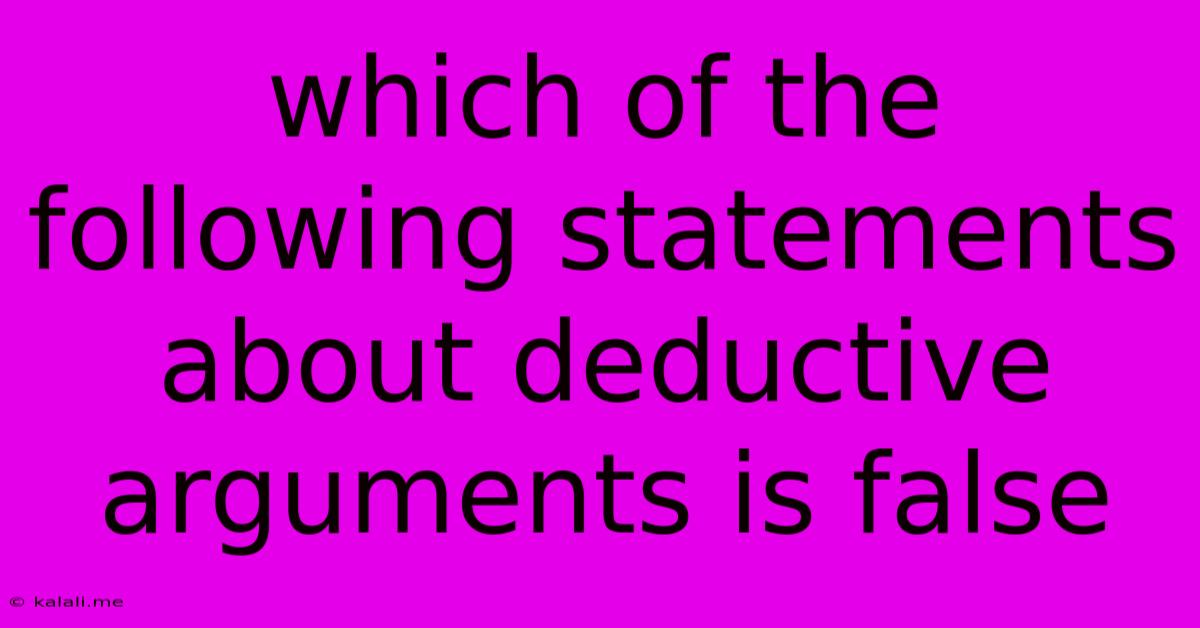Which Of The Following Statements About Deductive Arguments Is False
Kalali
Jun 13, 2025 · 3 min read

Table of Contents
Which of the Following Statements About Deductive Arguments is False?
Deductive reasoning is a cornerstone of logic and critical thinking. It involves drawing conclusions from a set of premises, where the conclusion is guaranteed to be true if the premises are true. This article will explore common misconceptions surrounding deductive arguments and identify a false statement about them. Understanding the nuances of deductive reasoning is crucial for effective argumentation and problem-solving.
Many students struggle with the subtle differences between deductive and inductive reasoning. Deductive reasoning provides certainty, while inductive reasoning offers probability. A common mistake is confusing the two or misapplying the principles of deductive logic.
Understanding Deductive Arguments: Key Characteristics
Before identifying the false statement, let's solidify our understanding of what constitutes a valid deductive argument. A deductive argument consists of:
- Premises: One or more statements assumed to be true.
- Conclusion: A statement derived logically from the premises.
A valid deductive argument ensures that if the premises are true, the conclusion must also be true. The validity of the argument is independent of the actual truth of the premises. A deductive argument can be valid even if its premises are false. However, a sound deductive argument is both valid and has true premises.
Common Misconceptions and the False Statement
Let's consider some common statements about deductive arguments and pinpoint the inaccurate one. We'll analyze each statement individually.
Statement 1: A deductive argument's conclusion adds new information not present in the premises. This statement is false. A deductive argument doesn't introduce new information. The conclusion is implicitly contained within the premises. It's a process of unpacking and clarifying what's already implied.
Statement 2: A deductive argument can be valid even if its premises are false. This statement is true. Validity depends on the logical structure of the argument, not the truth of the premises. A perfectly structured argument can still lead to a false conclusion if its starting assumptions are incorrect.
Statement 3: In a sound deductive argument, the conclusion is always true. This statement is true. A sound argument combines validity (correct logical structure) with true premises, guaranteeing a true conclusion.
Statement 4: Inductive arguments guarantee the truth of their conclusions. This statement is false. Inductive reasoning moves from specific observations to general conclusions, offering probability, not certainty. Unlike deductive arguments, inductive conclusions can be false even if the premises are true.
Statement 5: Deductive arguments are always easy to identify. This statement is false. While some deductive arguments are straightforward, others can be complex and require careful analysis to determine their validity. The structure might be obscured by convoluted phrasing or hidden assumptions.
Conclusion
Therefore, the false statements among those presented are Statement 1 and Statement 5. Statement 1 is false because deductive arguments, by their nature, don't introduce new information; the conclusion is inherently contained within the premises. Statement 5 is false because identifying deductive arguments can sometimes be challenging due to complexity or hidden assumptions within the argument's structure. Understanding this distinction is key to improving critical thinking and logical reasoning skills. Mastering deductive reasoning empowers you to analyze information more effectively and build more robust, persuasive arguments.
Latest Posts
Latest Posts
-
A Quadrilateral Pqrs Is Inscribed In A Circle
Jun 14, 2025
-
The Key Distinction Between Positive And Negative Reinforcement Is
Jun 14, 2025
-
Which Is Not A Part Of Respiratory System
Jun 14, 2025
-
Which Of The Following Is A Percussion Instrument
Jun 14, 2025
-
The First 15 Elements Of Periodic Table
Jun 14, 2025
Related Post
Thank you for visiting our website which covers about Which Of The Following Statements About Deductive Arguments Is False . We hope the information provided has been useful to you. Feel free to contact us if you have any questions or need further assistance. See you next time and don't miss to bookmark.